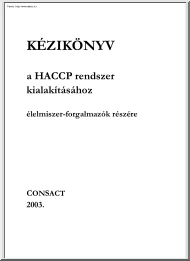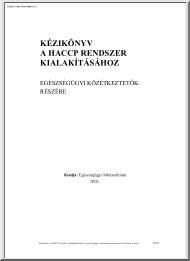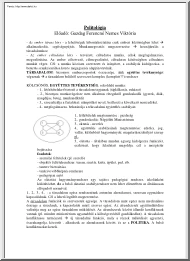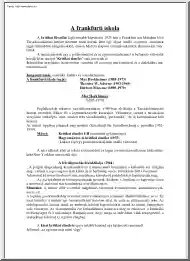Nincs még értékelés. Legyél Te az első!
Mit olvastak a többiek, ha ezzel végeztek?
Tartalmi kivonat
Food Safety / HACCP - Frequently Asked Questions What is Food Safety/HACCP? The implementation of a food safety management system is a systematic approach to prevent unsafe food. There are several methods and tools, such as HACCP, GHP or GMP, which together with a management system (e.g ISO 9001) form the bases for an overall food safety management system. The service includes either certification to HACCP standards (Dutch, Danish), to the technical Standard of the British Retail Consortium (BRC) and customised assessments to guidelines for food safety. DNV also offers consultancy services in this field as well as training. HACCP – Hazard Analysis and Critical Control Point GHP – Good Hygiene Practices GMP – Good Manufacturing Practices What is HACCP? Hazard Analysis and Critical Control Points (HACCP) HACCP is a prevention-based food safety system. It is a systematic method for analyzing a food process, determining the possible hazards and designating the critical control
points necessary to prevent any unsafe food. An HACCP-System consists of seven principles (Codex Alimentarius – Food Hygiene – Basic Texts): Principle 1: Conduct a Hazard Analysis Identify any potential hazardous biological, chemical or physical properties in raw material and processing steps and conduct a hazard analysis, e.g microbiological pathogens Principle 2: Identify Critical Control Points Identify the Critical Control Points (CCP), e.g cooking that must occur for a specific time and temperature in order to destroy microbiological pathogens. Principle 3: Establish Critical Limits Establish critical limits for preventing measures associated with each identified CCP, e.g time and temperature for cooking. Principle 4: Establish Monitoring Procedures Establish procedures to monitor CCP’s, e.g define how often you measure temperature during cooking. Principle 5: Establish Corrective Action Establish the corrective action to be taken when monitoring shows that a critical limit
has been exceeded, e.g empower employees to stop the line when cooking time was to short. Principle 6: Establish Record keeping Procedures Establish an effective record keeping system that documents the HACCP System, e.g record every time cooking time and temperature. Principle 7: Establish Verification Procedures Establish procedures to verify that the HACCP system is working, e.g calibrate the thermometer What is Good Hygiene Practice (GHP)? GHP follows the food chain from primary production to the final consumer (from "farm to fork"), setting out the necessary hygiene conditions for producing food, which is safe and suitable for consumption. An example for such a hygienic condition is personal cleanliness GHP consists of 8 chapters (Codex Alimentarius – Food Hygiene – Basic Text): 1.Primary production 2.Establishment: Design and facilities 3.Control of operation 4.Establishment: Maintenance and sanitation 5.Establishment: Personal hygiene 6.Transportation
7.Product Information and consumer awareness 8.Training What is Good Manufacturing Practice (GMP)? GMP was first introduced for the pharmaceutical industry as quality insurance tool and is today also used by the food industry. Today, there is no "official" GMP available Multinational companies, such as Nestle Kraft Food, have developed there own food-specific GMP. It consists of 9 chapters: 1.The principles 2.Production environment 3.Incoming materials 4.Processing 5.Storage/transport/distribution 6.Commercial/retail establishments 7.Personnel 8.Pest prevention 9.Glossary/key words What services do DNV offer in relation to Food Safety? DNV offers accredited certification, non-accredited certification/assessments, as well as training. Accredited certification: Netherlands Specification "Criteria for Assessment of an operational HACCP-System", January 1999 by the Dutch National Committee of Experts-HACCP Danish Standard "DS 3027: Food safety according to HACCP
– Requirements to be met by food producing companies and their subcontractors" DS 3027:1997. "Technical Standard for Companies Supplying Retailer Branded Food Products", October 1998 by the British Retail Consortium (BRC) Non-accredited certification/ assessments: Assessing GHP, GMP or HACCP, based on the Codex Alimentarius, EU-Directive on the Hygiene of Foodstuff and/or National Food Safety legislation. 2nd party audits. DNV can audit your suppliers according to your own requirements, to the EUDirective or to specially developed requirements from DNV to meet your needs. Training: A wide variety of different customised training courses. From the single one-day management awareness seminar, up to a 5-day HACCP training. What important documents must I know? Some keys documents are the following: Legal and official documents EU-Directive on the Hygiene of Foodstuffs, No. 93/43/EEC of the Council of June 14, 1993 and National Legislation’s. Food Hygiene – Basic
texts (incl. GHP and HACCP), Codex Alimentarius Commission, 1999 Standards for certification. Web Site: Codex Alimentarius Commission Netherlands Specification "Criteria for Assessment of an operational HACCP-System", January 1999 by the Dutch National Committee of Experts-HACCP Danish Standard "DS 3027: Food safety according to HACCP – Requirements to be met by food producing companies and their subcontractors" DS 3027:1997. The document can be ordered through Dansk Standard. "Technical Standard for Companies Supplying Retailer Branded Food Products", October 1998 by the British Retail Consortium (BRC). What are the benefits of HACCP-certification/Food Safety Assessment? To give the customers the confidence that the products have been produced hygienically and safe. To demonstrate the intention to take all reasonable precautions and exercise due diligence in the hygienic production of the products. Customers are also requiring certification or
assessment when they import into countries with Food Safety legislation. To significantly decrease the number of customer audits and therefore safe costs and management time. A cost-effective way to reduce wastage and recalls A certification or an assessment can help in reducing costs by having a better relationship with the national food safety authorities. Certification or assessment of a Food Safety Management System will increase the effectiveness of the Management System regarding food safety. The majority of British retailers have stated that registration to BRC will become mandatory requirement tosupply them. Why should I choose DNV as a partner? DNV is one of the few companies presently accredited by the Dutch, Danish and UK accreditation bodies for various HACCP and Food Safety Systems. DNV has extensive experience in auditing management systems and has experts for the certification and assessments of Food Safety Management Systems. Important companies, such as Pepsi-Cola in
Hungary, Whitebread in UK, Hakon Gruppen in Scandinavia and Pernod-Ricard in the Netherlands, trust in DNVs competence. What kind of training is available for Food Safety? DNV has developed 3-day Food Safety/HACCP course. This course is registered the RIPHH (Royal Institute for Public Health and Hygiene, London. Upon successful completion of this course, participants should: Understand why Food Safety is important. Know what international legal and other requirements exists for HACCP, GHP and GMP (e.g Codex Alimentarius, EU-Directive, Dutch Requirements, DS3027, BRC) Be able to understand the common best practices such as GHP and GMP Be able to understand the 7 HACCP principles, the implementation of an HACCP system and how these may be applied to control Food Safety. Be able to understand the interaction with other Management Systems
points necessary to prevent any unsafe food. An HACCP-System consists of seven principles (Codex Alimentarius – Food Hygiene – Basic Texts): Principle 1: Conduct a Hazard Analysis Identify any potential hazardous biological, chemical or physical properties in raw material and processing steps and conduct a hazard analysis, e.g microbiological pathogens Principle 2: Identify Critical Control Points Identify the Critical Control Points (CCP), e.g cooking that must occur for a specific time and temperature in order to destroy microbiological pathogens. Principle 3: Establish Critical Limits Establish critical limits for preventing measures associated with each identified CCP, e.g time and temperature for cooking. Principle 4: Establish Monitoring Procedures Establish procedures to monitor CCP’s, e.g define how often you measure temperature during cooking. Principle 5: Establish Corrective Action Establish the corrective action to be taken when monitoring shows that a critical limit
has been exceeded, e.g empower employees to stop the line when cooking time was to short. Principle 6: Establish Record keeping Procedures Establish an effective record keeping system that documents the HACCP System, e.g record every time cooking time and temperature. Principle 7: Establish Verification Procedures Establish procedures to verify that the HACCP system is working, e.g calibrate the thermometer What is Good Hygiene Practice (GHP)? GHP follows the food chain from primary production to the final consumer (from "farm to fork"), setting out the necessary hygiene conditions for producing food, which is safe and suitable for consumption. An example for such a hygienic condition is personal cleanliness GHP consists of 8 chapters (Codex Alimentarius – Food Hygiene – Basic Text): 1.Primary production 2.Establishment: Design and facilities 3.Control of operation 4.Establishment: Maintenance and sanitation 5.Establishment: Personal hygiene 6.Transportation
7.Product Information and consumer awareness 8.Training What is Good Manufacturing Practice (GMP)? GMP was first introduced for the pharmaceutical industry as quality insurance tool and is today also used by the food industry. Today, there is no "official" GMP available Multinational companies, such as Nestle Kraft Food, have developed there own food-specific GMP. It consists of 9 chapters: 1.The principles 2.Production environment 3.Incoming materials 4.Processing 5.Storage/transport/distribution 6.Commercial/retail establishments 7.Personnel 8.Pest prevention 9.Glossary/key words What services do DNV offer in relation to Food Safety? DNV offers accredited certification, non-accredited certification/assessments, as well as training. Accredited certification: Netherlands Specification "Criteria for Assessment of an operational HACCP-System", January 1999 by the Dutch National Committee of Experts-HACCP Danish Standard "DS 3027: Food safety according to HACCP
– Requirements to be met by food producing companies and their subcontractors" DS 3027:1997. "Technical Standard for Companies Supplying Retailer Branded Food Products", October 1998 by the British Retail Consortium (BRC) Non-accredited certification/ assessments: Assessing GHP, GMP or HACCP, based on the Codex Alimentarius, EU-Directive on the Hygiene of Foodstuff and/or National Food Safety legislation. 2nd party audits. DNV can audit your suppliers according to your own requirements, to the EUDirective or to specially developed requirements from DNV to meet your needs. Training: A wide variety of different customised training courses. From the single one-day management awareness seminar, up to a 5-day HACCP training. What important documents must I know? Some keys documents are the following: Legal and official documents EU-Directive on the Hygiene of Foodstuffs, No. 93/43/EEC of the Council of June 14, 1993 and National Legislation’s. Food Hygiene – Basic
texts (incl. GHP and HACCP), Codex Alimentarius Commission, 1999 Standards for certification. Web Site: Codex Alimentarius Commission Netherlands Specification "Criteria for Assessment of an operational HACCP-System", January 1999 by the Dutch National Committee of Experts-HACCP Danish Standard "DS 3027: Food safety according to HACCP – Requirements to be met by food producing companies and their subcontractors" DS 3027:1997. The document can be ordered through Dansk Standard. "Technical Standard for Companies Supplying Retailer Branded Food Products", October 1998 by the British Retail Consortium (BRC). What are the benefits of HACCP-certification/Food Safety Assessment? To give the customers the confidence that the products have been produced hygienically and safe. To demonstrate the intention to take all reasonable precautions and exercise due diligence in the hygienic production of the products. Customers are also requiring certification or
assessment when they import into countries with Food Safety legislation. To significantly decrease the number of customer audits and therefore safe costs and management time. A cost-effective way to reduce wastage and recalls A certification or an assessment can help in reducing costs by having a better relationship with the national food safety authorities. Certification or assessment of a Food Safety Management System will increase the effectiveness of the Management System regarding food safety. The majority of British retailers have stated that registration to BRC will become mandatory requirement tosupply them. Why should I choose DNV as a partner? DNV is one of the few companies presently accredited by the Dutch, Danish and UK accreditation bodies for various HACCP and Food Safety Systems. DNV has extensive experience in auditing management systems and has experts for the certification and assessments of Food Safety Management Systems. Important companies, such as Pepsi-Cola in
Hungary, Whitebread in UK, Hakon Gruppen in Scandinavia and Pernod-Ricard in the Netherlands, trust in DNVs competence. What kind of training is available for Food Safety? DNV has developed 3-day Food Safety/HACCP course. This course is registered the RIPHH (Royal Institute for Public Health and Hygiene, London. Upon successful completion of this course, participants should: Understand why Food Safety is important. Know what international legal and other requirements exists for HACCP, GHP and GMP (e.g Codex Alimentarius, EU-Directive, Dutch Requirements, DS3027, BRC) Be able to understand the common best practices such as GHP and GMP Be able to understand the 7 HACCP principles, the implementation of an HACCP system and how these may be applied to control Food Safety. Be able to understand the interaction with other Management Systems



